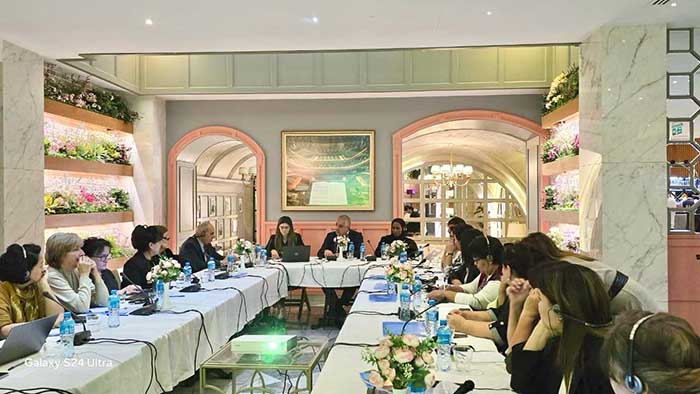ICBA Organizes WACAA Regional Dialogue in Baku to Empower Women for Climate Action in Agriculture
The International Center for Biosaline Agriculture (ICBA), successfully organized the Regional Strategic Dialogue: Climate Change and Women in Agriculture: Challenges and Opportunities in the Asia and the Caucasus (CAC) region on October 22-23, 2024 at the Iinstitute of Genetic Resources of Azrabijan, in Baku, Azerbaijan. Funded by the Islamic Development Bank (IsDB), this event was part of ICBA’s preparations leading up to COP29 in Azerbaijan, with the aim to address critical gender issues in agriculture and empower women to lead climate action initiatives across the CAC region.
The dialogue opened with an inaugural session featuring remarks by Dr. Tarifa Alzaabi, Director General of ICBA, Dr. Charbel Tarraf, Chief Operations and Development at ICBA, and Prof. Zeynal Akparov, Director General of the Genetic Resources Institute at the Ministry of Science and Education of Azerbaijan.
Dr. Tarifa Alzaabi, emphasized the significance of the alliance, stating, “The launch of WACAA by ICBA during COP28 marks a pivotal moment in ICBA’s vision to place women at the center of sustainable agricultural development and climate action. Built on four main pillars—capacity development and knowledge transfer, financial mobilization, policy and advocacy, and networking and collaboration—WACAA envisions reaching 1 million women globally by 2050. Through these pillars, we aim to strengthen the economic resilience of women, enhance their access to skills and resources, and promote their leadership in tackling the impacts of climate change on agriculture. This alliance is about creating opportunities; it’s about making a lasting impact on food security, resilience, and environmental sustainability.”
The event brought together 30 women experts from research and academic institutions across the Central Asia and Caucasus (CAC) region. Participants from diverse backgrounds in agriculture, climate science, and policy key gender-related concepts such as equity, intersectionality, and women’s empowerment, examined global and local programs, and shared success stories. The discussions focused on community-based approaches and innovative technologies to improve food security and build climate resilience, while emphasizing strategies to empower women leaders and enhance their decision-making roles in sustainable agriculture. Additionally, discussions highlighted the potential of new technologies to transform agricultural practices and mitigate climate impacts. The event also explored establishing a women-led network in the CAC region to facilitate collaboration and share best practices, with a dedicated session showcasing lessons learned from women-led initiatives.
Kaseeva Gulnaz, Head of Group of the Companies Agrolead, Kyrgyzstan, shared her thoughts on the event: “The seminar “Women in Agriculture: Challenges and Opportunities” was useful and very effective. The audience of the seminar consisted of experienced women – leaders working in the agricultural sector from different areas from Kazakhstan, Kyrgyzstan, Uzbekistan, Azerbaijan and others. The seminar raised current general and country-specific issues in agriculture and gender aspects. In addition, business connections were established between the participants, an excellent exchange of experience was held. Specifically about myself, I can say that at this seminar I not only received useful knowledge, but also signed a contract for the supply of high-quality seeds.”
Ms. Makpal Bulatova, Project Manager at the Islamic Organization for Food Security (IOFS), remarked: “The Islamic Organization for Food Security (IOFS) recognizes and appreciates ICBA’s initiative, (WACAA), as it aligns with IOFS’s broader vision for sustainable food security and climate resilience as outlined in its Vision 2031. IOFS acknowledges the significant contributions of women in agriculture and values initiatives aimed at empowering them and advancing smart agricultural practices. While IOFS remains committed to its strategic objectives, including the promotion of innovative technologies and climate-smart agriculture within its member states, it encourages collaboration between organizations working towards shared goals. In this regard, IOFS remains open to further exchanges of ideas and knowledge with key partners such as ICBA, especially regarding programs that benefit the agricultural sector in the CAC region.”
ICBA remains dedicated to empowering women leaders, farmers, and scientists through initiatives like WACAA. With its long-standing commitment to developing innovative solutions for food security and livelihood challenges in arid and saline environments, ICBA aims to contribute to a more sustainable and equitable future for all.


Comments are closed.